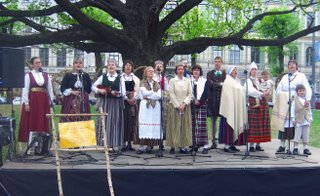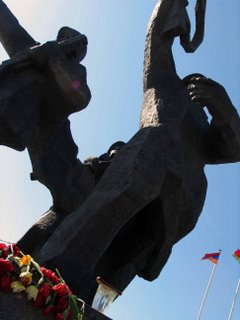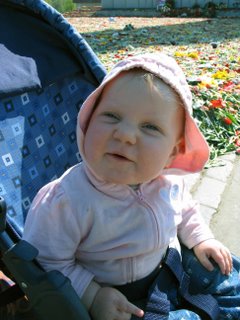This is more footage from the town of Pidhajtsi in Western Ukraine, shot in August, 2005.
If a peasantry is a population bound to and dependent for survival upon the land through various means that grossly benefit local or not-so-local lords while keeping the individual farmer more or less locked in his/her place--such as via outright serfdom or through credit arrangements and dependency on local "lords" to pay out some cash—then the cash-crop and subsistence farmers of Western Ukraine qualify as a contemporary, postmodern peasantry of the latter sort.
In the previous two posts I have briefly discussed the plight of the people/farmers of the Western Ukrainian countryside. Here I continue: This is footage of men loading sacks of processed wheat flour into their wagons and tractors (see previous post for a comment about the persistence of wagons in the Ukrainian countryside).
There are three main cash-crops that people sell in Pidhajtsi and throughout the Western Ukrainian countryside; in order of economic relevance (i.e., in order of what is most lucrative for the peasant household), they are: sugar beet, wheat, and cow's milk. Each of these crops are harvested by the peasant household and brought elsewhere to be processed. Cow’s milk and wheat are brought to local processing plants where they are made, in the case of milk, into cheese, creams, pasteurized milk, etc., and into processed flour in case of the wheat. Sugar beets are brought to a burjakpunkt or drop-off point from whence they are hauled elsewhere to be processed into sugar. All of the sugar in Ukraine comes from sugar beets.
Each family has roughly 1.5 hectare of land in the fields. Nearly all of the work is done by hand using rudimentary, though time-honored, implements and little or no modern machinary. In addition to the aforementioned cash-crops (there are sometimes others, but those are the main ones) a typical household raises foodstuffs for home consumption: red beets, yellow beets (for feed), corn (for feed), potatoes and a variety of other vegetables and herbs. There is a common plumb-and-apple orchard and most homesteads have apple trees, while some have plumb and cherry trees and berry bushes. Plumbs, though certainly good for eating and commonly used in pastries, is also necessary for making the local samohonka or moonshine, which usually is not a vodka or horylka (the Ukrainian word for vodka), but a plumb-brandy called, in this part of Ukraine, slivjanka. (Note: plumb-brandy is called slivovitsa by other peoples of Eastern Europe, and sometimes rakija in the Balkans; to Hungarians, it is palinka). It is also important to note that just about every household has either one cow or a goat for milk from which creams and cheeses are made, and plenty of fowl (as shown in a previous post).
Just a few American families employing American agribusiness technology could farm the land around Pidhajtsi; instead, the land supports about 7-8,000 people, if you include the nearby villages as "suburbs” of Pidhajtsi (Ukrainians live clustered into towns and villages with the fields surrounding the settlements). Many analysts complain that Ukraine’s agricultural potential is massively underdeveloped.
When farmers take their foodstuffs to be processed, they are repaid by the factories not in cash but in barter: they receive a cut of the final processed goods made from their beets/wheat/milk. A portion of the processed goods go for home consumption; the rest is sold whenever the need for cash arises at a local, weekly market (every Thursday in Pidhajtsi). In this footage, the men are loading their share of the processed flour made from their wheat.
Sugar beets yield sacks of sugar, and milk yields pasteurized milk or other processed dairy products. With the wheat, people will bake their own bread at home and will use the sugar that was the fruit of their own labor. The processed, pasteurized dairy products often go to market, as most villagers use milk straight from the cow in their own diets.
I was universally told by people in Pidhajtsi that it is not worth it for anyone to bring milk to the dairy factory unless one has at least three or more cows. Thus, in the afternoon you can see Babas carrying bucket after bucket to and from home and factory a number of times.
Whether it is the dairy, beet, or wheat factory, everyone will tell you that the exchange rate is unfair and to the advantage of the processors.
Who owns and runs these factories?
I tried to get an answer to this question in the following ways:
1) I tried to get some interviews and to film inside some of the factories, but neither the mill nor the dairy plant was willing to oblige. At the dairy factory, I was told by the plant’s manager that the owner was not present, that he does not live in Pidhajtsi and that he is probably at another one of his plants. The manager also said that she already knew the owner would not be willing to be interviewed, and when I asked if I could interview her, she said she had no right to speak about the company and told the security guards present to escort me and my second-cousin off the factory grounds. And oh, one of the guards had already made sure that my videocamera was turned off.
It was more of the same at the mill; thus the footage here is shot not just across the street from the plant but from across the street and down the road a bit, as security had told me to move on.
At the burjakpunkt or beet pick-up site, I was allowed to film, though the people rather nervously allowed me to do so. I was hollered at anytime I turned my camera on any worker. The most violent response to my camera came from the man in the room where the local peasants came to collect their sacks of processed sugar. Some of that footage will appear later.
2) I tried to get some answers from local officials, but most of them were reticent, even after the Orange Revolution, to answer my questions about who owns what and how they came to own it.
However, I do know the following from the tales of locals: The mill and the dairy factory both were part of a Soviet-era conservatives factory that produced a range of foodstuffs (bread, pastries, jams, jarred salads, pickles, dairy products, etc.). It collapsed in the early 1990s, and most people say that the managers of the factory ran their business into the ground and sold off factory equipment for their own, short-term gain (others defend them saying that they could not adjust to market conditions so quickly after the end of the command economy). The mill and dairy factory were reopened years later as private businesses, but on much smaller scales.
Corruption and and lack of transparency in the agricultural sector and especially in the Ukrainian countryside are truly large-scale problems. Many in Pidhajtsi have come to feel that Yushchenko has neither the intention nor the will to truly take on rural problems, and sometimes complain that like all previous administrations, his is focused all-too-exclusively on industry (which also means on Eastern Ukraine). One major sign to many locals that Yushchenko is not concerned with their plight in the countryside was his memorandum with Yanukovych in which Yushchenko agreed to extend parlaimentary immunity from prosecution to local government officials. Another symptom of this lack of will for many is his close relationship with Petro Poroshenko, Ukraine’s so-called Chocolate King. Poroshenko owns a large chocolates-and-sweets factory in addition to other businesses, and is definitely a New Eastern European worth an estimated $350 million, according to Warsaw-based Gazeta Wyborcza. He is widely perceived by many as profiting from the unfair barter practices in the countryside—a cheap supply of sugar for his factory contributing to is considerable wealth.
However, Ukrainians at the local level do have this problem: they barely self-organize to take on the power of rural agricultural corporations and officials. Western Ukraine is not Latin America and certainly not Chiapas, where there are local movements developing at the most grassroots of levels to take on or refuse the power of middlemen (coyotes) and corrupt politicians in the agricultural sector. Though the Orange Revolution showed an unprecedented level of civic activism and self-organization in Ukraine, and though such activism remains higher than it was in pre-OR times, people in general seem to have once again put all of their hope in the state and in politicians to make a difference. This is too bad. One recent speaker ruminated on whether Ukrainians have truly broken from what he called the following, centuries-old and unhappy tradition in Ukraine: apathy and disillusionment with political and civil-society processes creating a cycle of inaction only occasionally interupted by periods of revolutionary upheaval. He was not sure that Ukrainians are now solidly discovering the middlepath in which everyday actions by an active citizenry truly makes a difference, though many have proclaimed such is the result of the Orange Revolution.
This is what makes the apparent disappearance of the NGOs of the election campaign and Orange Revolution period so sad, and why it was so lamentable that the main (largest and best organized) activist group Pora! was more or less hijacked by those who wanted to make of it a political party. What Ukraine badly needs today is not more political parties but ongoing grassroots organizing efforts; and what Ukrainians should take as a contemporary model are the collectivist, self-organizing efforts of people on the ground in various parts of Latin America--or examples from their own history. A Zapatista, or even better yet, a Makhnovist (but without the guns) or OUN inspired model for regional self-organization could work well in agricultural Western Ukraine. This time, the fight would not be with foreign invaders but with locals, and the goal an effort to ensure a better rate of exchange. A Ukrainian Cesar Chavez?














